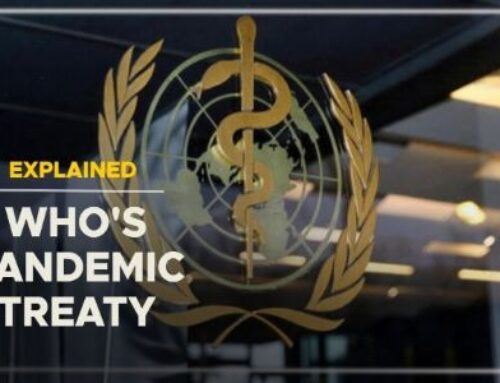Preparing for Persecution (Part 3)
Knowing Scripture and relying on the promises of God are essential when undergoing persecution for our faith.
Tuesday, May 10, 2022
By Matthew White
Reprinted from American Family Association
In my previous two blogs discussing early Christian persecution found in Acts 4, I pointed out The Reality of Persecution and then The Reason for Persecution.
In today’s blog, I want to consider: The Response to Persecution.
In Acts 4 we learn that because Peter and John’s service to God was causing a stir and posing a threat to the religious leaders, they had been jailed for the night, awaiting what amounts to a trial before the Sanhedrin the next day.
As they were brought before these powerful people to answer for the healing of the lame man, how did the apostles respond? How did the early church respond?
- Grounded In Truth
The Sanhedrin began their questioning about the healing, inquiring, “… By what power, or by what name, have ye done this?” (Acts 4:7).
Peter responded by saying “If we this day be examined of the good deed done to the impotent man, by what means he is made whole…” (Acts 4:9).
The truth that Peter and John were able to discern was that the healing of this lame man was not the real issue.
These leaders could have cared less that a man had been healed.
They were concerned with what “power” or what “name” was allowing them to do such miracles – as they feared a threat to their power.
Peter and John recognized this, and they essentially asked, “Is it wrong to do something good? Is it wrong to heal a lame man, to do a good deed?”
They understood the heart of the question.
Remember, Christ had not misled them concerning future persecution and hatred from the world. He had told them to prepare for it and expect it.
He had told them they would be put before “the synagogues, and [unto] magistrates, and powers, …” (Luke 12:11). Now, here they were.
The root of our struggles are not fleshly, they are merely manifested in fleshly ways.
For we wrestle not against flesh and blood, but against principalities, against powers, against the rulers of the darkness of this world, against spiritual wickedness in high [places] (Ephesians 6:12).
For though we walk in the flesh, we do not war after the flesh: (For the weapons of our warfare [are] not carnal, but mighty through God to the pulling down of strong holds;) (2 Corinthians 10:3-4).
Since we are talking about being grounded in truth and aware that our battles are spiritual, let me mention three things about this dark spiritual force we face.
There is the dominion of darkness
Jesus refers to Satan as “… the prince of this world …” (John 12:31).
Paul refers to Satan as “… the prince of the power of the air, the spirit that now worketh in the children of disobedience:” (Ephesians 2:2).
Paul also called Satan “… the god of this world hath blinded the minds of them which believe not…” (2 Corinthians 4:4).
To deny that we have a very real enemy who has been granted some degree of power is utter foolishness.
To be effective in any battle, one must be aware of the enemy.
There is the deviancy of darkness
The forces we are up against seek to subvert God’s work and deviate from all things God has unfolded in His created order.
Take any issue, apply that truth, and you’ll see how successful that tactic has been.
Consider marriage and family. God’s way is clear; one man, one woman, for life.
Therefore shall a man leave his father and his mother, and shall cleave unto his wife: and they shall be one flesh (Genesis 2:24).
And God blessed them, and God said unto them, Be fruitful, and multiply, and replenish the earth, and subdue it… (Genesis 1:28).
God’s prescription for the family is very clear, but look at how the world has perverted it.
How can we forget the 2015 decision that legalized “gay marriage”? We’ve also seen attempts to normalize polygamy, and even polyamory.
Consider the issue of life. God’s view is that all life is precious.
Before I formed thee in the belly I knew thee… (Jeremiah 1:5).
You knit me together in my mother’s womb, I am fearfully and wonderfully made (Psalm 139:13-14).
Look at the attack on life. People are literally advocating killing babies outside the womb if that’s what the mother wants.
A bill in California (AB-2223) and one in Maryland (SB-669), both of which, because of the language they use (perinatal), could be interpreted to allow an infant’s life to be taken anywhere from a few days after birth to up to 18 to 24 months, with no liability on the parties involved.
Consider God’s plan for gender. There are only two, and they are fixed.
So God created man in his [own] image, in the image of God created he him; male and female created he them (Genesis 1:27).
The transgender movement has taken the world by storm in the past decade.
We have women claiming to be men, men claiming to be women and even being allowed to compete in women’s sports.
We even have people who claim they are fluid in their gender.
And it doesn’t help that a large portion of our population indulges them in their fantasies.
Consider government. God ordained the government primarily as a means to punish evil and reward good.
Look how far governments around the world have deviated from that purpose, including ours.
There are the devices of darkness
Lest Satan should get an advantage of us: for we are not ignorant of his devices (2 Corinthians 2:11).
Put on the whole armour of God, that ye may be able to stand against the wiles (schemes, strategies) of the devil (Ephesians 6:11).
And no marvel; for Satan himself is transformed into an angel of light (2 Corinthians 11:14).
Beware of false prophets, which come to you in sheep’s clothing, but inwardly they are ravening wolves (Matthew 7:15)
Our enemy doesn’t come in a red suit and pitchfork. He has much more subtle devices he uses against us.
Considering all of this darkness, it’s no wonder Paul said we must put on the “whole armour of God” (Ephesians 6:11).
Just as Peter and John and the apostles and the early church were engaged in a spiritual battle, we are too.
The quicker we recognize, and are grounded in that truth, the more effective we will be in that battle.
- We Must Be Guided By the Spirit
Then Peter, filled with the Holy Ghost … (Acts 4:8).
John MacArthur said, “There was one essential prerequisite for Peter’s powerful defense. He faced persecution triumphantly because he was filled with the Holy Spirit.”
I mentioned earlier that Jesus told the disciples they would be put before “the synagogues, and [unto] magistrates, and powers” (Luke 12:11).
In the same breath, He told them how to respond when that time came. He said, “take ye no thought how or what thing ye shall answer, or what ye shall say: For the Holy Ghost shall teach you in the same hour what ye ought to say” (Luke 12:11-12).
That is what was taking place here. They were standing before the powers, the Sanhedrin in this case, and the Holy Spirit was guiding Peter in how to respond.
Do you want to know why we mess things up so often? It is because we are not yielded to the Holy Spirit of God.
We move ahead when the Holy Spirit says wait. We wait when the Holy Spirit says move. And then we wonder why the results are a disaster.
If we are not yielding to the Holy Spirit now, during the good times, what makes us think we are going to suddenly do a better job of that when the difficult times come?
We need to be practicing yielding now, because if we want to respond well to persecution, like the early church and many faithful heroes before us, we must learn to yield to the Spirit of God.
MacArthur said,
“This principle is foundational to all the rest; yieldedness to the Holy Spirit is the key to successfully handling persecution. Because Peter was Spirit-filled, persecution merely drove him closer to the Lord. Lack of being filled with the Spirit is the reason the church today has difficulty facing opposition… Peter and John confronted the world head-on, with a boldness and eloquence that caused their opponents to marvel. They were victorious because they were Spirit-filled.”
May we realize the foolishness of trying to live the Christian life in our own strength.
- We Must Be Gutsy In Our Proclamation
Being filled with the Holy Spirit,” (Acts 4:8) Peter responded to the Sanhedrin by saying “Be it known unto you all, and to all the people of Israel, that by the name of Jesus Christ of Nazareth, whom ye crucified, whom God raised from the dead, [even] by him doth this man stand here before you whole. This is the stone which was set at nought of you builders, which is become the head of the corner (Acts 4:10-12).
Notice the boldness of this once cowardly betrayer.
Not many days prior he had denied Christ in fear. Now he was proclaiming Christ at great risk. This is an awesome example of what the Holy Spirit can do.
The Sanhedrin had asked for a name and Peter was about to give them one.
In an ironic twist that can only emphasize the providence of God, Peter made this bold declaration in the belly of the beast.
MacArthur said,
“In the very citadel of the Sanhedrin’s power Peter put his judges on trial by proclaiming the truth about the living Christ to those responsible for His execution. By pointing out that they executed Jesus but God raised Him up, Peter showed them to be the enemies of God.”
Picture it if you can. Peter, John, and the healed man, standing in the center, encircled by the Sanhedrin.
Peter says, “by the name of Jesus Christ of Nazareth, whom ye crucified, whom God raised from the dead, [even] by him doth this man stand here before you whole” (Acts 4:10).
Don’t miss the courage it took to say what he said. He was standing before people who could have imprisoned and murdered him like they did Christ, or free him if he would simply say the right things.
But instead, in one fell swoop Peter cut them to the ground.
He said it was the name of Jesus, the one they had all despised and rejected ….
He said it was the name of Jesus, the one they had falsely accused and crucified …
He said it was the name of Jesus, the one whom God raised from the dead.
It’s by His name, a name no doubt the Sanhedrin had hoped they’d scrubbed from being mentioned again …
It’s by His name, Peter said, “doth this man stand before you whole.”
What courage that took.
And then he went on to tell them the one they’d rejected was the foundation and corner of it all: This is the stone which was set at nought of you builders, which is become the head of the corner (Acts 4:11).
Peter appealed to the O.T. to make his case. He quoted a passage they would have all committed to memory: “The stone [which] the builders refused is become the head [stone] of the corner” (Psalm 118:22).
I can just imagine Peter pointing to them all and saying, “You all are the builders, Christ is the Stone, you all rejected Him, but now He is the head.”
Do you understand the boldness it took for Peter to say what he did?
If our lives or freedom were on the line in a similar way, I wonder how we would respond.
But what he said next may have topped it all: “Neither is there salvation in any other: for there is none other name under heaven given among men, whereby we must be saved” (Acts 4:12).
Peter essentially said to the religious elite, “It’s Christ or nothing. It’s Christ or judgment. It’s Christ, or hell.”
It takes courage to preach an exclusive Christ, in such an inclusive age. But that is our job nonetheless.
And here’s the good news. Quite often I remind people that the message we preach is the most exclusively inclusive message that exists.
There is only one Way, but through that one Way, all who would, may come.
That one Way, is Jesus.
May we be as bold as Peter in preaching that name.
How do we respond to persecution?
By being grounded in truth, guided by the Spirit, and gutsy in our proclamation.







Leave a Reply, please --- thank you.